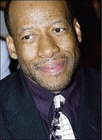'Dancehall music can empower the young'
Published: Sunday | February 8, 2009

Huntley Brown
The following is the second instalment of a two-part series on Jamaican pianist Huntley Brown. Part one was published last Sunday.
Michael Reckord, Gleaner Writer
Internationally acclaimed Jamaican pianist Huntley Brown has strong views on the influence of dancehall music on young minds. There are at least three reasons for that.
First, he and his wife, Annette, have four daughters and are naturally concerned about societal influences on them. Second, he is, in his own words, "a Christian-concert pianist". Third, starting his musical career, as he did, playing in hotels and clubs on Jamaica's north coast, Brown knows first hand about the power of negative lyrics on audiences. Dancehall is a powerful force that has influenced young Jamaicans in "the wrong way", he told The Sunday Gleaner.
"When they listen to songs that degrade women, glorify drugs, use foul language and encourage violence, sooner or later, the young people will start to imitate what they hea and that's exactly what has happened in Jamaica. There has to be an urgency to fix this or we will lose an entire generation," he stated.
Brown, the pianist for Ruth Graham and Friends Ministries, a group which tours the world, using music to win souls for Christ, uses genres of music in his work and he does not advocate banning dancehall. He wants it, instead, to be used to "empower young people".
His opinion is that "dancehall, in its present form. needs to be fixed ... not abolished. Music is a cultural expression and dancehall is the language spoken by many people in Jamaica. As a Christian musician, I believe all we have to do is package the gospel in the dancehall language and then watch it transform the lives of the listeners."
The devil's instrument
He zeroes in on what churches, not the government, should do, and goes back into history to make his case.
"The early church had the same discussions we are having now but from a very different perspective. The discussion they had was whether the pipe organ could be used in church. At that time, it was called the devil's instrument as it was used in the opera houses in Europe, so the pastors decided it could not be used in the church," he said, and expressed gratitude that Bach and other composers created religious music for the organ.
Even the C major chord, he said, was at one time called "the devil's chord", and banned by some pastors from being played in their churches. "At the time, all (church) songs were done in a minor key," he explained.
But times have changed and, he said, "all we have to do with dancehall is change the lyrics, use the tune, and, with the anointing of the Holy Spirit, we will transform Jamaica for God's glory."
Incredible seminars
When Brown visited Jamaica in 2006, he conducted seminars for young people in conjunction with Yvonne Coke and her Hands Across Jamaica movement. The seminars were, he said, incredible and left him "greatly encouraged".
"Jamaica has some of the best musicians in the world and the new group of musicians coming up right now is poised to take the world by storm. All they need is a chance and the support from other musicians," Brown declared.
He plans to give some support himself by way of "a major recording", he told The Sunday Gleaner, "something along the lines of Beethoven meets dancehall. I have been working on a rough draft for a few years and, very soon, I am going to contact my friends in the music industry."
Brown has a lot of experience working with communities as his ministry extends from churches to auditoriums, colleges, opera houses and gang-infested urban high schools. He relates the anecdote of the time when a troublesome student body was allowed to assemble, under police guard, for the first time in four years, to hear him. They responded with rapt attention during the concert and, at the end, a noisy standing ovation.
Fasting and prayer
Asked about the use of music to help solve Jamaica's crime and violence problems, especially among our youth, Brown said he would first advocate a national three-day period of repenting, fasting and prayer.
"Second," he continued, "I would make the study of music mandatory in all schools. Studies have shown that different music genres boost intellectual development in children.
"Research also shows children who play the piano scored 35 per cent better in intelligence tests than children going to computer classes or not taking any class at all. To become a good musician takes hours of practice. Kids practising have no time to get into trouble."
He also said he would want a Vankoevering keyboard put in every school, calling it "the technology of the future," with programmes young students can use to create their own music. Additionally, he would encourage musicians to adopt a school, help financially and give advice.
"We could change the nations," he opined.
Brown's plans to help Jamaica's youth, through music, unfortunately will have to wait a while. He won't be in Jamaica for the near future as 2009 is crammed with concert tours to several states in the US, Canada, Siberia, Estonia, China and Hong Kong.














